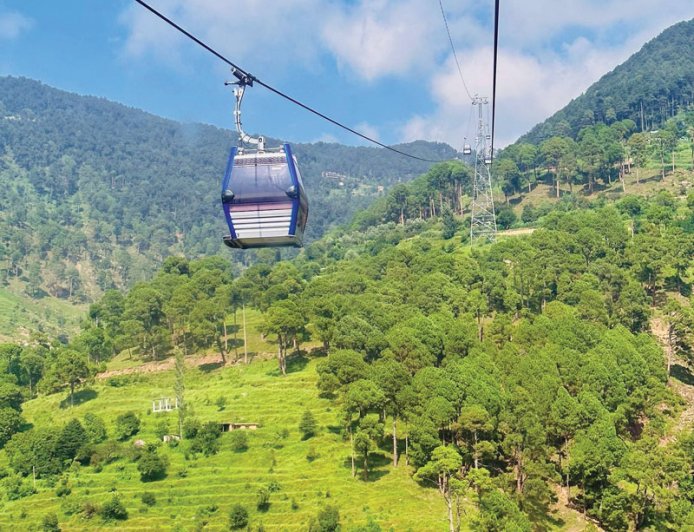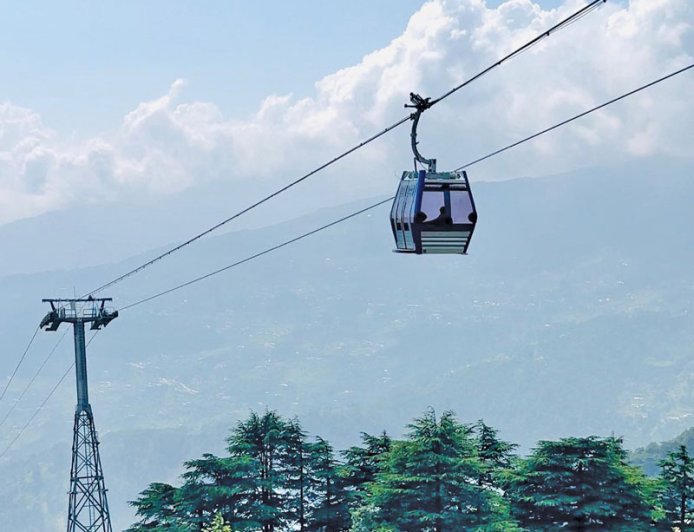We look forward to changing the connectivity landscape of India

Syed Junaid Altaf
Group Executive Director, FIL Industries Pvt Ltd
How do you view the overall infrastructure development in the country and the growing relevance of ropeway infrastructure?
India’s infrastructure has seen significant development over the last decade and continues to grow at a healthy pace. Whether it is our National Highways network, railways, or metro connectivity, India is slowly closing the last mile gap, and, on its way to becoming an infrastructurally developed nation. The government’s recent increase in the budget allocation for infrastructure spending to 3.3% of GDP will further propel the nation towards fulfilling the ambitious vision to transform India by 2047 - when we celebrate a century of independence.
In an era where sustainability and responsibility towards planet earth have become the norm, Green mobility can play a crucial role in building an eco-friendly transport network. Among effective and innovative green transport solutions are ropeway systems, increasingly gaining traction for their various benefits. Considering the global focus on sustainable travel to help cut down carbon emissions, India is focusing on the development of ropeways as an alternative mode of transportation. Not only do ropeways significantly cut down carbon emissions through their use of electric-powered mobility options in contrast to the fossil-fuel powered cars, buses, trains and planes that add to air pollution, they also connect the world to the difficult-to-reach terrains of the mountains. They are also cost-effective transporting around 6,000-8,000 passengers per hour between destinations making them the preferred mode of transport for both locals and tourists alike.
We, at FIL Industries Pvt Ltd, built our pilot aerial ropeway mobility project Skyview by Empyrean connecting Patnitop and Sanget in Jammu five years ago and not a single tree was cut during construction. On the contrary, we planted 8,000 trees and saplings and each decision was made keeping the environment and local communities in mind. We follow the same principles of sustainability as we currently build India’s longest ropeway system connecting Dehradun-Mussoorie, Phase I of which should be completed by September 2026.
Government has given thrust on the development of ropeway systems especially at hilly terrains under the programme of Parvatmala. How do you look at this as an opportunity for your business and expertise?
Firstly, the fact that the government announced in 2022, the flagship ‘Parvatmala Pariyojna’ scheme to develop 250+ ropeway projects across India over 5 years itself reflects how integral ropeway systems will be for India in the years to come. Further, with Nitin Gadkari, Minister of Road Transport & Highways (MoRT&H) indicating that as part of this Public-Private-Partnership scheme, the manufacturing of ropeway components will be promoted as part of the ‘Make in India’ initiative, the ropeway infrastructure ecosystem gets a further boost.
 This is a very exciting time for us with the PPP model of the scheme opening avenues for collaboration in infrastructure projects. At present, eight ropeway projects covering 60 km have already been announced. We look forward to changing the connectivity landscape of India and placing the country on the world map when it comes to state-of-the-art green mobility solutions, with our expertise and knowledge of the domain. We are already collaborating with several global partners like POMA, MND Group, E.R.I.C Ropeway Engineering, and Sage Geotech Inc for our projects, each of whom are hugely respected in their own fields.
This is a very exciting time for us with the PPP model of the scheme opening avenues for collaboration in infrastructure projects. At present, eight ropeway projects covering 60 km have already been announced. We look forward to changing the connectivity landscape of India and placing the country on the world map when it comes to state-of-the-art green mobility solutions, with our expertise and knowledge of the domain. We are already collaborating with several global partners like POMA, MND Group, E.R.I.C Ropeway Engineering, and Sage Geotech Inc for our projects, each of whom are hugely respected in their own fields.
Which are the new and upcoming ropeway projects of the company in the country?
We are currently building a 5.5 km long ropeway connecting the twin cities of Dehradun and Mussoorie which will significantly reduce the travel time across 33 km in the hilly terrain from 1.5 hours to 15 minutes. This ropeway will have 10-seater diamond cabins that are being introduced in India for the first time. These cabins are not only luxurious but also highly efficient, providing an exceptional combination of comfort and speed. With a capacity to carry 1,300 passengers per hour in each direction, the ropeway will serve as a vital infrastructure project, promoting tourism and easing transportation challenges in the region.
This project reflects the company’s dedication to innovation and excellence, contributing to India’s growing network of modern ropeway systems aimed at improving connectivity, especially in mountainous regions.
How has the company emerged as a major player in ropeway infrastructure? How do safety and sustainability play major role in your projects?
Since we launched our pilot Skyview Gondola, we’ve honed our expertise and emerged as a major player in the ropeway infrastructure space in India. Our vision for green mobility perfectly aligns with the government’s ‘Parvatmala Pariyojna’ scheme. With the potential to revolutionize tourism and improve access to remote areas, our ropeways are designed to ease access for tourists in hilly terrains while improving the daily lives of local communities, which in turn, directly impact the economy of the region.
 Advanced technologies, such as Monocable Detachable Gondola systems, make our ropeways efficient while transporting large numbers of passengers—up to 8,000 per hour—while minimizing operational costs. Safety is the paramount concern in all our projects. Our cable cars are CEN certified, which is a European safety standard, which means that on a daily basis, we undertake at least 200 checks every morning before the first run of the cable car. Regular maintenance and inspections are integral to our operational protocols, fostering a culture of trust among our workforce and passengers.
Advanced technologies, such as Monocable Detachable Gondola systems, make our ropeways efficient while transporting large numbers of passengers—up to 8,000 per hour—while minimizing operational costs. Safety is the paramount concern in all our projects. Our cable cars are CEN certified, which is a European safety standard, which means that on a daily basis, we undertake at least 200 checks every morning before the first run of the cable car. Regular maintenance and inspections are integral to our operational protocols, fostering a culture of trust among our workforce and passengers.
What is your market outlook of ropeway infrastructure in India? What are your future plans?
The market outlook for ropeway infrastructure in India is highly promising, driven by a combination of factors including increasing tourism, the need for improved connectivity in difficult terrains, and the push toward sustainable transportation solutions.
The ropeway infrastructure market in India is on a robust growth path, driven by the country's need for efficient transportation solutions in challenging terrains and urban environments. With government support, technological advancements, and a focus on sustainability, the market offers vast opportunities for companies like Skyview by Empyrean to expand and innovate. The company’s future plans reflect a commitment to leading this growth with a strong pipeline of projects aimed at enhancing connectivity and improving travel experiences across India.







